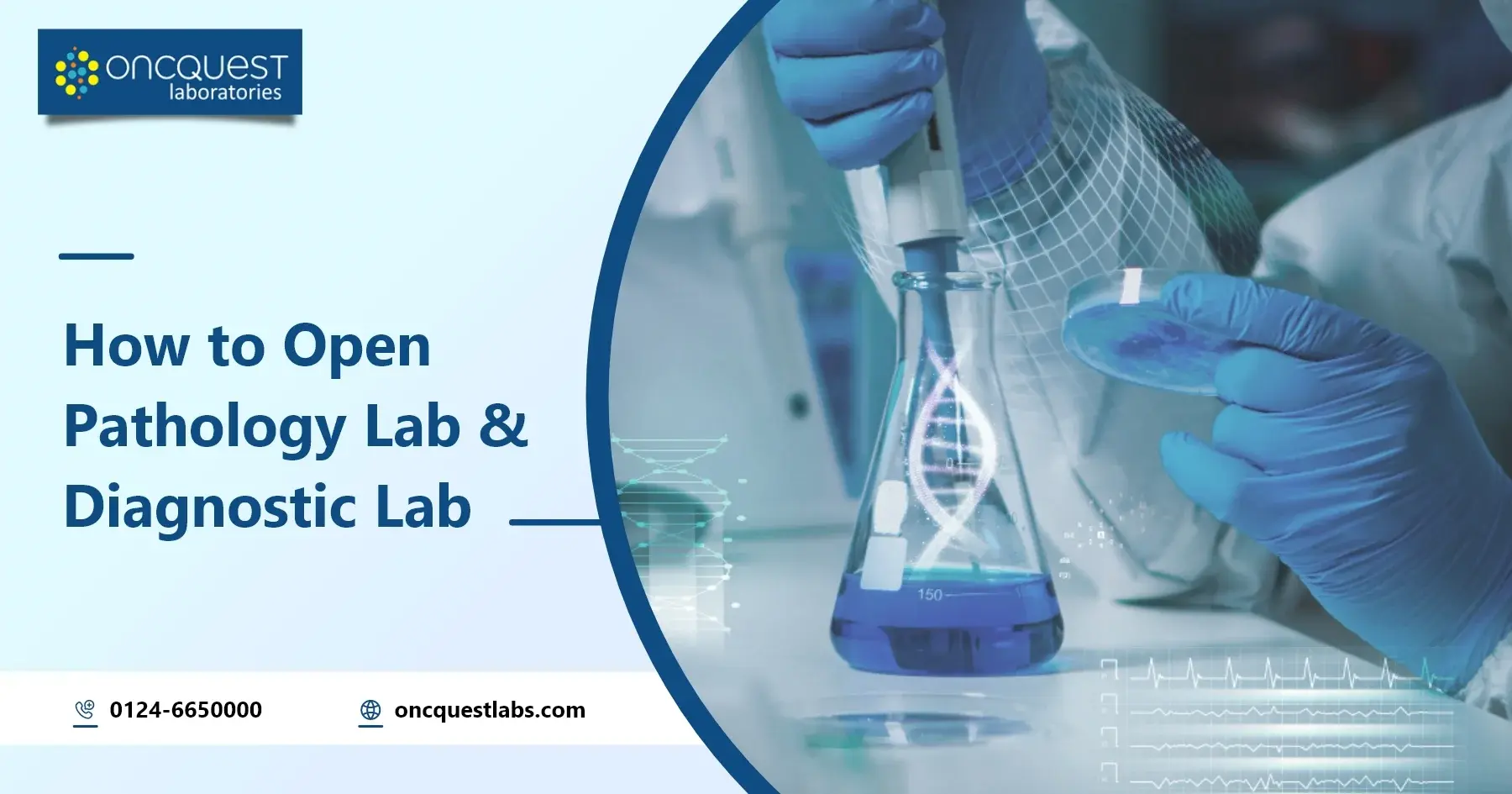Are you obsessed with healthcare and interested in making a difference in people’s lives? Opening a pathology lab can be an extremely gratifying venture for you. A pathology lab performs an essential position within the scientific subject by diagnosing illnesses appropriately, which is important for effective remedy and affected person care.
Be part of us on this adventure as we discover the world of pathology and empower you to turn your passion for healthcare into a thriving enterprise that definitely affects the lives of many.
Contents
- 1 Need of pathology
- 1.1 Benefits of pathology
- 1.2 Qualification required to open pathology lab
- 1.3 Who can open pathology labs?
- 1.4 Requirements to open pathology labs
- 1.5 What is NABL certification and its benefits?
- 1.6 How to get NABL certification?
- 1.7 Test performed in pathology lab
- 1.8 Become a partner of Oncquest labs
- 1.9 Frequently asked questions
Need of pathology
- Accurate Diagnoses
- Disease Monitoring
- Research Support
- Quality Assurance
- Education
Benefits of pathology
- Precise identification of diseases
- Tailored treatment plans
- Improved patient outcomes
- Track progression/regression
- Assess effectiveness of treatments
- Early detection of complications
- Data for medical advancements
- Development of new therapies
- Understanding disease mechanisms
- Ensure lab and test reliability
- Maintain standards and protocols
- Compliance with regulatory bodies
- Training future healthcare professionals
- Continuing education for practitioners
- Dissemination of medical knowledge
Qualification required to open pathology lab
To set up a pathology lab in India, numerous qualifications and requirements must be met. First, academically, a BSc degree in laboratory techniques or a relevant degree is wanted, although current amendments also permit MBBS holders or those with an MSc in pathology to open a lab. Those ranges ought to be identified by using the Scientific Council of India (MCI). Additionally, a license from the MCI is necessary to perform the lab.
Other than academic qualifications, numerous registrations and certificates are required. This includes acquiring a certificate and registration under the Scientific Established Order Act for the lab’s status quo, in addition to certification from the countrywide accreditation board for trying out and calibration laboratories (NABL) for taking a look at reputation. Furthermore, a no objection certificate (NOC) from the hearth and municipal departments is necessary for protection and waste disposal protocols.
Financial considerations are critical, as setting up a pathology lab requires huge investments in instruments, infrastructure, staff, and management. Reagents and software programs are critical for effective testing and reporting, although fees can range notably primarily based on exceptional functionality.
Concerning infrastructure, the lab’s location plays a critical role in attracting customers and ensuring operational performance. Commercials are vital to elevating consciousness about the lab’s services and region. Staffing necessities consist of microbiologists, medical doctors, nurses, biochemists, managers, attendants, and other employees for easy operations.
Selecting the right type of pathology lab primarily based on location, financial sources, and the available workers is critical for achievement. Extra functions, including speedy checking out, accuracy, home trying-out alternatives, a 24/7 helpline, and physician recommendations, can enhance the lab’s attraction and purchaser delight.
In-depth expertise in pathology and healthcare rules is paramount because of the sector’s effect on individuals’ lives and the desire for steady accuracy and reliability.
Who can open pathology labs?
- A pathologist who is certified and licensed by the Indian Medical Council is essential for the operation of a pathology lab.
- The number of required microbiologists and biochemists varies based on the lab’s size and scope, necessitating the presence of an assistant pathologist.
- A degree in medicine is mandatory for individuals working as lab technicians in the pathology lab.
Requirements to open pathology labs
Government establishments oversee the legality of lab initiatives and groups, particularly in sensitive fields like pathology labs that play a crucial role in people’s lives. Those labs diagnose illnesses, make critical choices, and save lives. But making sure of the legality and proper functioning of such labs is essential.
Lab groups must be meticulous in their operations, which consist of gathering, storing, experimenting on samples, supplying outcomes, and transporting them properly. Regrettably, many labs in India do not adhere strictly to those strategies, leading to capacity dangers for society.
The Clinical Institutions (Registration and Law) Act of 2010 sets standards for healthcare offerings and facilities; however, its enforcement varies throughout states, leaving gaps in regulation.
What is NABL certification and its benefits?
- NABL certification gives numerous benefits by means of participating with numerous regulatory groups like Apeda, FSSAI, EIC, and others.
- This collaboration eases the process of worldwide reputation and streamlines reputation strategies through special certification from our bodies.
- Rather than separate assessments, they conduct a single combined assessment, boosting patient confidence in technicians and device authenticity.
- NABL’s reputation through the worldwide laboratory accreditation cooperation (Ilac) arrangement or mutual popularity arrangement (MRA) allows global recognition as an Ilac MRA member, which is powerful.
- This simplifies international enterprise operations, reduces expenses, and ensures adherence to national standards and technological accuracy.
- NABL also has a mutual reputation settlement with the Asia-Pacific Laboratory Accreditation Cooperation, improving accreditation credibility and facilitating enterprise operations.
How to get NABL certification?
| Step in the Accreditation Process | Description |
| File Application for accreditation | Applicant submits five copies of the application and quality manual to NABL. |
| Acknowledgment by authority (NABL) | NABL reviews the quality manual to ensure compliance with ISO 15189 specifications. |
| Document review | Lead Assessor evaluates the quality manual and conducts a reassessment of the laboratory. |
| Pre-assessment of CAB | Based on the assessment report, the laboratory may be required to make specific improvements before the final assessment. |
| Final assessment of CAB accreditation | NABL conducts the final assessment to determine accreditation eligibility. |
| Scrutiny by assessment report | The assessment report is scrutinized to ensure all requirements are met. |
| Recommendation for accreditation | NABL recommends accreditation based on assessment findings. |
| Approval for accreditation | Authorities approve the accreditation recommendation. |
| Issue of accreditation certificate | NABL issues the accreditation certificate to the laboratory. |
Required Documents for Accreditation:
1. Standard Operating Procedures (SOP)
2. Objectives
3. Policies and procedures
4. System manuals
5. Checklist
6. Forms
7. Records
8. Formats
Equipment Needed for Pathology Lab:
– Freeze
– Desktop/laptop
– Injection
– Incubator
– Test Tube
– Flask
– Thermometer
– Slide
– Microscope
– Centrifugation equipment
– Software
– Trashcan
– Bathroom facilities
– Pipette
Test performed in pathology lab
- CRP Test
- Liver Function Test(Lft)
- Kidney Function Test (Kft)
- Lipid Profile Test
- CBC Test
- Hba1C Test
- Cholesterol Test
- Vitamin D Test
- Vitamin B12 Test
- CA125 Test
- HBsAg Test
Become a partner of Oncquest labs
- Join India’s Leading Super Specialized Laboratory Network.
- Minimum investment required is approximately ₹2-3 lakh.
- Expect a good return on investment.
- Exclusive Oncquest collection center opportunity.
Eligibility Criteria:
- Space requirement of approximately 150-250 sq. ft. on the ground floor with toilet facilities.
- Preference given to candidates with a medical background.
- Seeking self-motivated entrepreneurs.
If interested, please click on the following link to connect with us:
Frequently asked questions
Q1: How much does it cost to open a pathology lab?A1: Cost of opening pathology labs in India is around 10-20 lakh. But if you contact the oncquest lab then you can open it with a minimum investment of 2-3 lak
h.
Q2: How to start a pathology laboratory business?
A2: Pathology laboratory business is very easy to start. Just contact the oncquest labs. Minimum investment of 2-3 lakh is required. You should have space around 150-250 sq. ft.
Q3: Who can open a pathology lab in India?
A3: BSc degree or diploma is needed to open pathology in India. MBBS and MSc holders can also open laboratories. However certification and license from Medical Council of India [MCI] is required.
Q4: Can I open pathology after DMLT?
A4: Yes, you can open pathology in India after completing Diploma in Medical Laboratory Technology (DMLT).
Q5: Can I open pathology lab without degree?
A5: BSc degree or diploma is needed to open pathology in India. MBBS and MSc holders can also open laboratories. However certification and license from Medical Council of India [MCI] is required.





![Blood Test for Hair Loss [Male/Female] Blood Test for Hair Loss](https://oncquest-blog.s3.ap-south-1.amazonaws.com/blog/wp-content/uploads/2023/12/12044200/Blood-Test-for-Hair-Loss.webp)